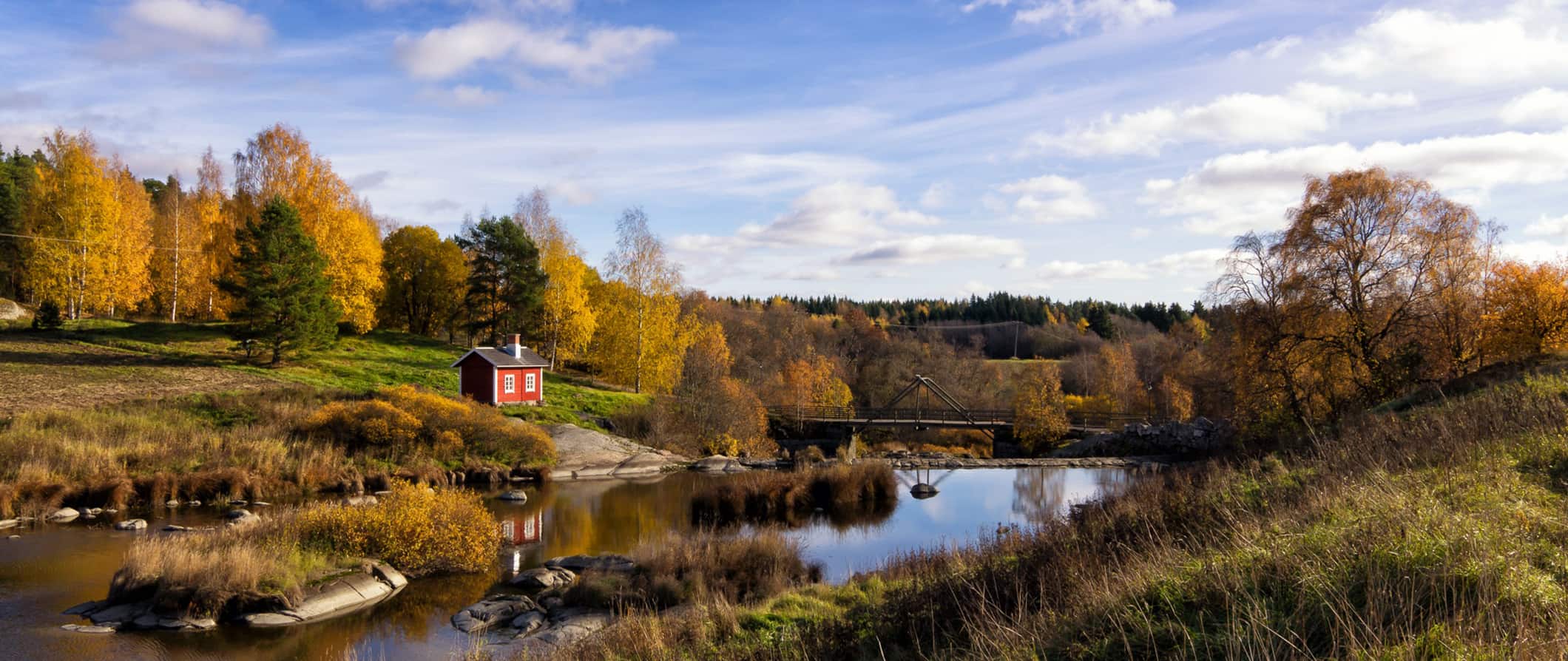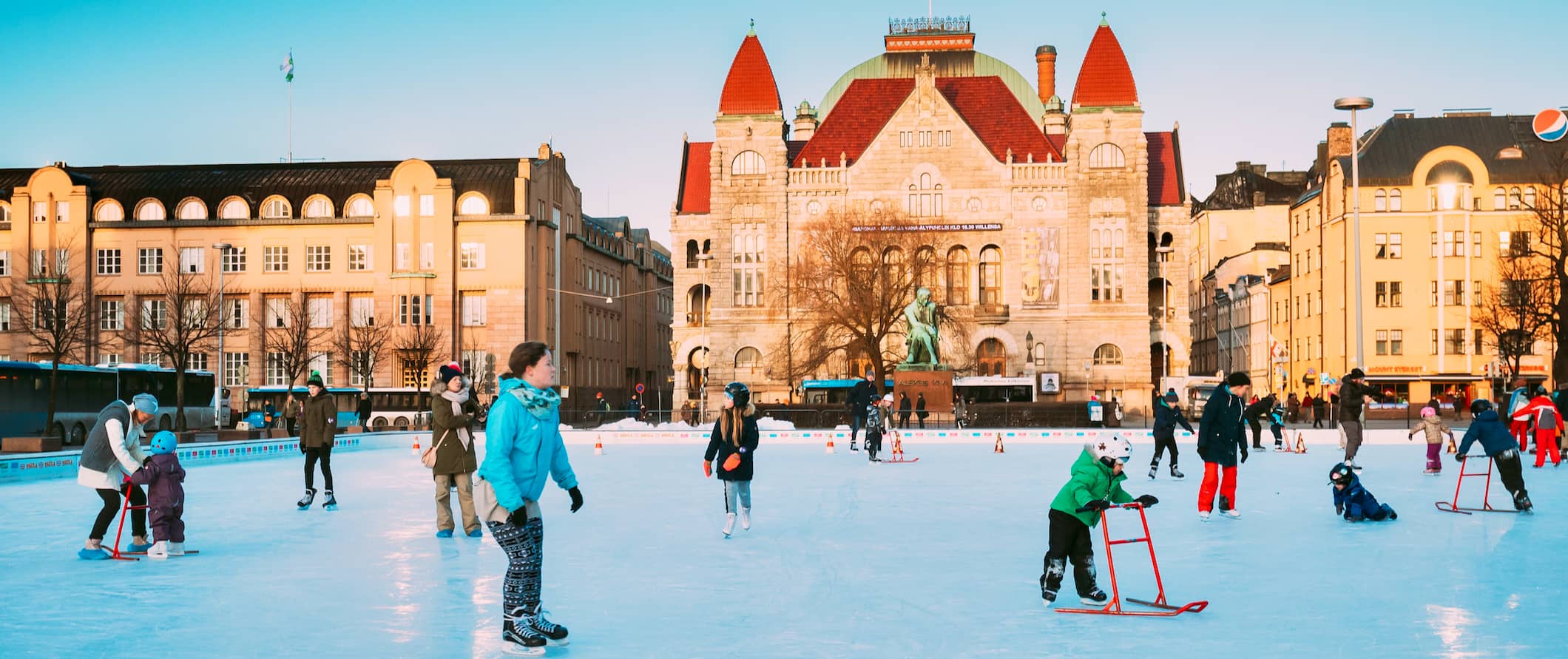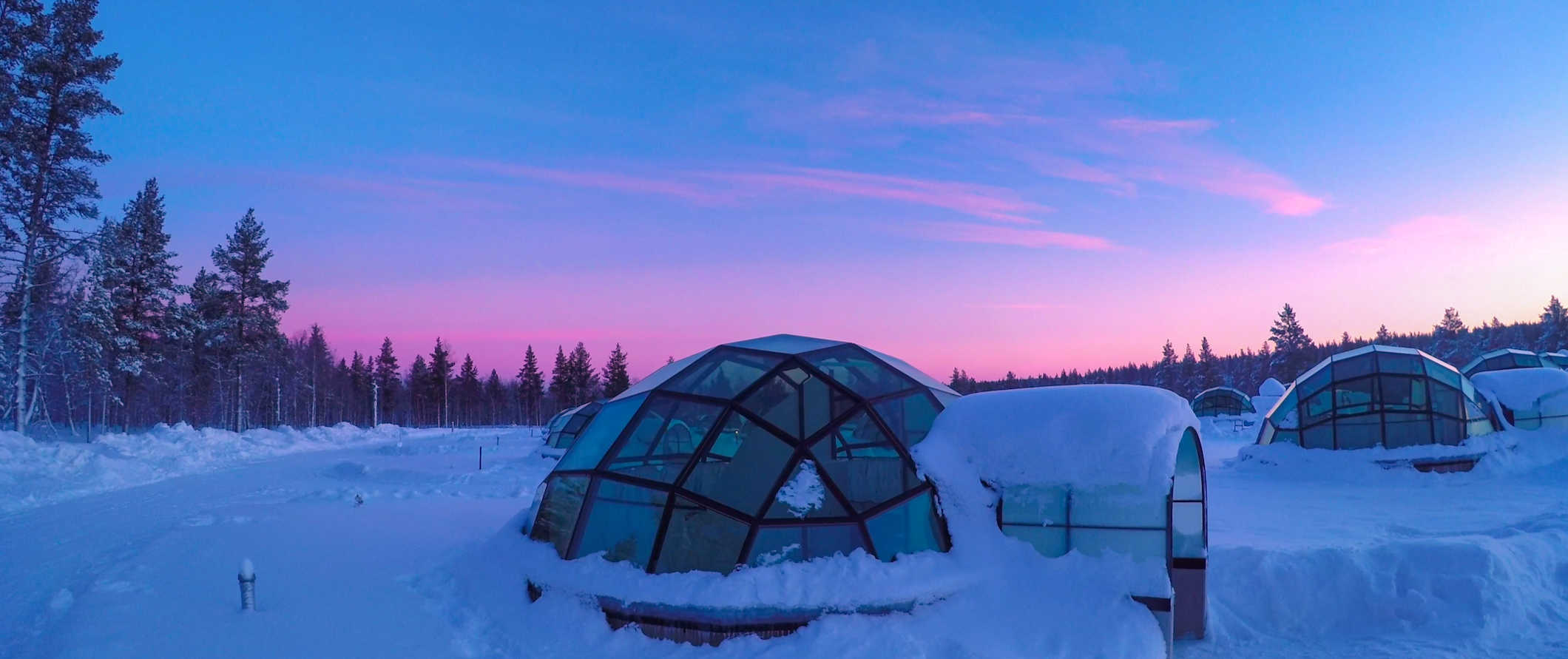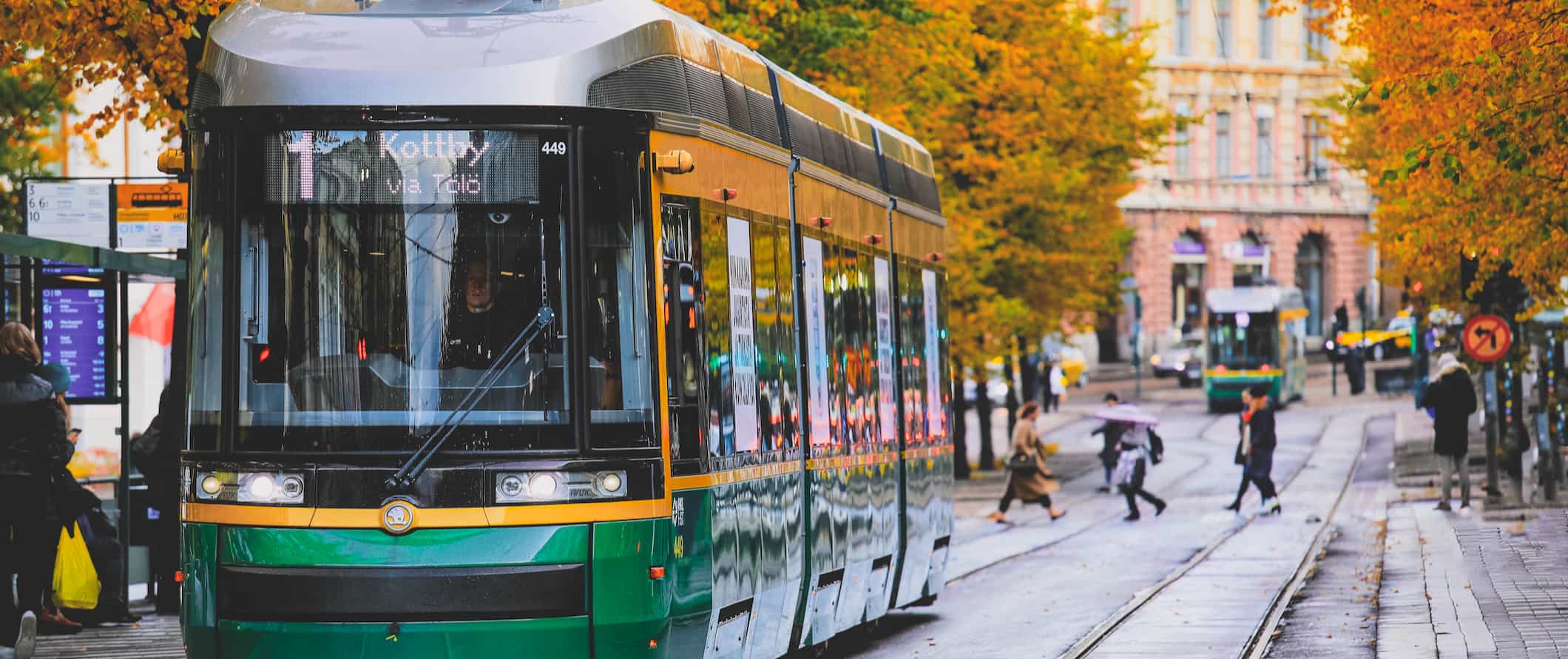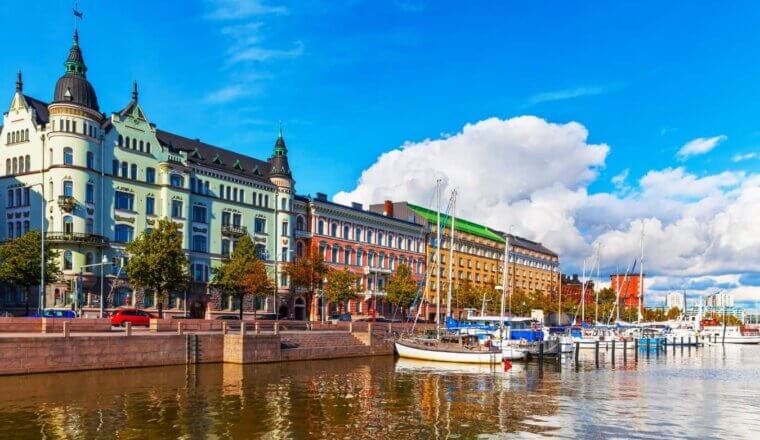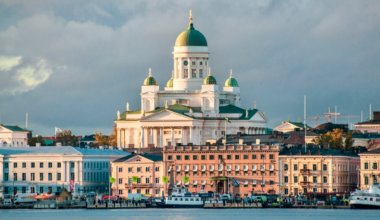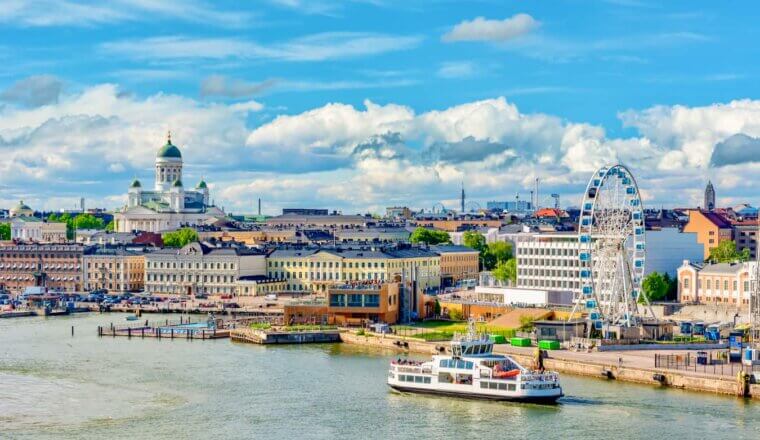Finland is a beautiful country. Home to epic mountains, scenic waterfalls, stunning fjords, plentiful saunas, and the chance to see the northern lights, it’s an incredible destination perfect for outdoorsy travelers and adventure lovers.
Due to its out-of-the-way location and the fact that Finland is expensive, many travelers skip visiting the country when they explore Europe.
But this is a mistake.
Finland has a lot to offer and there are plenty of ways to save money here. I think it’s one of the most underrated destinations in Europe — especially if you love the outdoors!
This travel guide to Finland can help you plan your trip, save money, and make the most of your time in this amazing nation.
Table of Contents
Click Here for City Guides
Top 5 Things to See and Do in Bath
1. Explore the Salla Reindeer Park
This park in the Arctic Circle is where you can feed reindeer, pet huskies, take a canoe trip, do some hiking, or try snowshoeing and skiing. There are reindeer competitions (reindeer are an important part of the indigenous culture here), husky sleigh rides, and midnight canoe trips when the sun is out all night. In the winter months you can experience the northern lights as you hike through the forest at night using snowshoes. If hiking isn’t your thing, there are nighttime reindeer sleigh rides for those hoping to see the northern lights. You can try out dogsledding and steer your very own team of huskies too. Admission to the park is 10 EUR (tours have additional costs).
2. See the Northern Lights in Lapland
This is hands-down one of the best things to do in the country. In the northern part of Lapland, you can see the northern lights shining almost every night when the sky is clear, whereas in southern Finland they are only visible 10-20 nights each year. Lapland is within the Arctic Circle so there is essentially 24 hours of darkness each day from November until January. There are plenty of guided tours you can join, though you can also venture out on your own to save money too if you’re on a budget. A three-hour snowmobile tour to see the northern lights costs around 155 EUR per person. September-April is the best time to see them.
3. Visit Santa Claus Village in Rovaniemi
This Christmas amusement park is great for anyone traveling with kids. You can meet “Santa,” do snow-shoeing safaris, feed reindeer, and learn about Finnish Christmas traditions through the ages. The adorable village includes Santa’s official office, his Christmas house, the main Santa Claus Post Office, and the house of Mrs. Claus and Santa’s reindeer. Adults can enjoy a variety of dining options ranging from upscale restaurants to fun bars. The Ice Bar is rebuilt each year and is full of snow and ice sculptures. Admission is free and the village is open all year.
4. Explore Helsinki
Historic, small, filled with green space, and set on the Baltic Sea, Helsinki is a scenic city that doesn’t get huge tourist crowds like other European capitals. Visit the six islands that make up Suomenlinna Sea Fortress (which dates to the late 1700s) or get your history fix at the National Museum of Finland. If you’re feeling the need for some relaxation, stop by one of Helsinki’s many saunas. And for a unique experience, book the sauna room on the Skywheel Helsinki Ferris wheel. The city is filled with world-class museums and restaurants and is perfect for a few days of exploring.
5. Stay in an ice hotel or glass igloo at the SnowHotel
Located in Lapland, everything in the SnowHotel is made of ice — including your bed (you get warm furs and sleeping bags, don’t worry)! The hotel is rebuilt each year from snow and ice, so the appearance is constantly changing. It sleeps up to 70 guests, and there are additional glass igloos that make for excellent star gazing. Enjoy sauna experiences, search for the northern lights, and plenty of ice art. There’s also an ice restaurant here too which serves local cuisine on frozen plates. The bar serves tasty craft cocktails in glasses made from ice too. A basic room with a double bed costs 200 EUR per night. You can also stay in smaller glass igloos as well.
Other Things to See and Do in Finland
1. Go ice climbing
Finland is known for its impressive ice formations, including frozen waterfalls and tall ice walls inside deep canyons or valleys. Companies like Bliss Adventure can outfit you with the right gear and introduce you to ice climbing in places like Tajukangas Falls and Korouoma Canyon (Korouoma is the most popular place to ice climb in the country). Prices vary but plan to spend around 100 EUR for a short tour. If you’re not afraid of heights and if you’re a bit of a thrill-seeker, try rappelling from the top of the Tajukangas Ice Falls (it’s about 30 meters high).
2. See Pakasaivo Lake
This lake in the north of Finland was once a place where indigenous Sámi worshipped. The 60-meter-deep lake is a meromictic lake, which means the water on the surface and at the bottom never mix (normal lakes mix at least once a year when the water at the surface cools off and becomes denser, causing it to sink). This creates an oxygen-free environment where the contents at the bottom are perfectly preserved. The area is known as the Hell of Lapland as people used to believe there was another realm under the lake. There is also a giant’s kettle here (a deep glacial pothole) that people believed tunneled all the way to hell.
3. Tour the King’s Road
This route is an old postal route running between Bergen, Norway to the former Finnish capital of Turku, and then across Finland to St. Petersburg, Russia. The 330-kilometer (205-mile) trail dates to the 15th century and it follows the southern coast of Finland. It’s accessible all year with well-paved roads and plenty of scenic stops along the way. You’ll take in manor houses, medieval churches, tiny villages, and endless scenic countryside. You can do the entire Finnish route in a day via car, though 2-3 days is better so you can make plenty of stops. If you’re feeling adventurous, you can also cycle the route in around one week.
4. Visit the Lampivaara Amethyst Mine
Lampivaara Hill is known for its amethysts (a type of purple quartz). The amethysts in this region were created 6 million years ago and on a mine tour, you can learn more about this precious mineral and then get a chance to dig around and find your own to take home as a souvenir. The mine is part of Pyhä-Luosto National Park and is located in northern Finland 90 minutes north of Rovaniemi. Tour prices vary from 35-66 EUR per person and include transportation. If you have your own vehicle, you can visit and tour the mine for 19 EUR.
5. Explore Raanua Wildlife Park
This is the northernmost nature reserve in the world and a fun place to visit with kids. There are over 50 different animal species here, including the only polar bears in Finland as well as lynx, wolves, and brown bears. Because it’s a predominantly outdoor park, you’re able to see the animals in a much more natural habitat than most zoos. There is no artificial lighting or indoor enclosures so you need to bring your own flashlight if visiting later in the day during the winter (when the sun sets early). Admission is 23.50 EUR.
6. See the Old Church of Sodankylä
Located in Lapland, this church is Finland’s best-preserved wooden church. The steeple-less church was built from timber in 1689 and was commissioned by King Charles XI of Sweden, who paid for it. The exterior and interior are incredibly well-preserved, with a dark timber interior and exterior that resembles more of a log cabin than a traditional European church. In the summer, religious services and weddings are often held here. Admission is free but be sure to dress respectfully.
7. Learn Finnish cultural history
The ethnographic Museum of Local History in Kemijärvi showcases what life was like in rural Finland at the turn of the 20th century. The main building is home to a traditional farmhouse and living quarters, maid’s chamber, daughter-in-law’s chamber, and living room so show you exactly what life was like for the Finnish working class. In addition to the house, the grounds include a granary, a workshop, a smoke sauna, a barn, and a stable that you can wander and explore. Admission is 10 EUR.
8. Go hiking
There are almost 40 national parks in Finland, each with hiking trails and camping sites. In the winter, they make for great places to cross-country ski or go snowshoeing. Nuuksio National Park is only 45 minutes from Helsinki and is filled with calm lakes, green forests, and rocky trails. Archipelago National Park, in Southwestern Finland, has more islands than any archipelago in the world. With its calm islets and colorful villages, canoeing or kayaking this park is a must. If you want to get off the beaten path, be sure to visit Pallas-Yllästunturi National Park in the north, where you can hike and stay in traditional villages. Additionally, wild camping is free in all the national parks as Finland has ‘freedom to roam’ laws (Jokamiehen Oikeudet) that enable you to wild camp in national parks if you are quiet and respectful.
9. Explore the Harbor Islands
There are over 330 islands that make up the Helsinki city archipelago. Suomenlinna is the easiest to reach with regular municipal ferries (you can take a ferry directly from Market Square). Vallisaari and Kuninkaansaari are two other islands worth visiting, as they used to be military bases closed off to the public (during the Viking era, Vallisaari was used as an outpost that would light a fire whenever a Viking raid was coming so people could prepare). The islands have since been reclaimed by nature and turned into parks dotted with abandoned fortifications. You can explore on your own or take a guided tour; there are a ton to choose from, with most lasting 1-2 hours and costs around 25 EUR.
10. Compete in the Air Guitar World Championship
Held every year at the Oulu Music Video Festival, this competition started out as a joke in 1996 but has evolved into a major festival that attracts thousands. If you happen to be in Oulu in the month of August, be sure to check out this quirky competition. Anyone can enter with just a 35 EUR entry fee. Even if you don’t want to compete you should definitely attend if you can — it’s one of the most unique festivals in the world!
11. Wander the Seurasaari Open-Air Museum
Located north of Helsinki on Seurasaari Island, the Seurasaari Open-Air Museum allows you to get up close to numerous traditional Finnish buildings. They aren’t replicas either; the buildings were collected from all over the country and physically moved here. There are houses, cottages, outbuildings, a windmill, and more. Opened in 1909, guided tours are available daily during the summer. Admission is 10 EUR
12. Go skiing
Levi is Finland’s most beloved ski resort located in Lapland (it’s the location of the Alpine World Cup Race). There are 43 slopes here for all abilities and over 200 kilometers (124 miles) of trails for cross-country skiing. There’s even a dedicated area for snowboarders, plus dogsledding and a reindeer park. A one-day pass costs 49 EUR. Pyhä-Luosto National Park, Saariselkä, Kuusamo, and Jyväskylä are other excellent places to ski too.
13. See Turun Linna (Turku Castle)
Turun Linna (Turku Castle) is located in Turku on the Aura River. The castle dates back to the 1200s and is one of the oldest buildings in the country. It helped defend the region from Russia during the Middle Ages, though much of the castle was destroyed during World War II and later rebuilt. Inside are two large dungeons as well as ornate banquet halls that are often used for municipal events. Tours take place all summer (June to August) and admission is 12 EUR.
14. Learn about the Sámi
The Sámi are the only indigenous people in the EU. Their language and culture are endangered, and so they’re governed by an autonomous government in Inari (Finland’s largest municipality). They’re famously known for their reindeer herding, which is at the core of their culture. Visit communities in Inari, Enontekiö, and Utsjoki to see Sámi culture up close. In Inari, don’t miss the Siida indoor and outdoor museum where you’ll learn about culture, art, and nature through interactive exhibits. But if you want to really spend time with the Sámi, come in spring when most of the Sami markets, concerts, and dances take place all over Northern Lapland. VisitLapland.com has a comprehensive list of activities and tours for getting to know the Sami people, including a visit to a traditional reindeer farm.
`
Finland Travel Costs
Hostel prices – In the summer, large hostel dorms with 8 or more beds start at 28 EUR while smaller dorms with 4-6 beds cost 43 EUR. In the off-season, prices are 2-3 EUR cheaper per night. Private rooms cost 75 EUR in the peak season and 55 EUR in the off-season. Free Wi-Fi is standard and most hostels do not have self-catering facilities.
Finland has “freedom to roam” laws that enable free wild camping all around the country for those with a tent. If you’d prefer to stay in a campground with amenities, expect to pay 14-18 EUR for a basic tent plot for two people without electricity.
Budget hotel prices – A budget hotel with a private bathroom starts at 80-120 EUR during the peak summer season. In the off-season, budget rooms start at 65 EUR.
On Airbnb, private rooms start at 40 EUR (though they average double that). If you’re looking for an entire home or apartment, expect to pay at least 75 EUR, though prices usually average over 100 EUR. Book early for the best deals.
Food – Finnish cuisine leans heavily on fish, meat (specifically pork), and hearty vegetables like potatoes. Reindeer is commonly eaten as well as wild game like deer and moose. Smoked salmon and smoked or pickled herring are also popular dishes. Like their Scandinavian neighbors, Finns also enjoy dark bread and cheeses, usually as part of an open-faced sandwich (these are the go-to breakfast choice).
Overall, food in Finland is expensive. Your average casual restaurant charges around 13 EUR for a meal while fast food (think McDonald’s) is 9 EUR. For a three-course meal with table service, expect to pay at least 40-80 EUR.
Pizza costs around 8-10 EUR for a large while Thai or Chinese food costs 10-15 EUR for a main dish. If you want to splash out while in Helsinki, I suggest Ravintola Aino for good Finnish food (try the reindeer). Dishes cost between 50-62 EUR but are incredibly tasty!
Beer costs 7 EUR while a latte/cappuccino is 4 EUR. Bottled water is 1.70 EUR.
If you plan on cooking your own food, groceries cost between 50-65 EUR per week for basic staples like vegetables, bread, pasta, and some fish or meat.
Backpacking Finland Suggested Budgets
On a backpacking budget of 70 EUR per day, you can stay in a hostel dorm, cook all your meals, limit your drinking, take public transportation to get around, and do free activities like visiting the free museums, hitting the beach, and relaxing in the parks. If you plan on drinking, add 10-15 EUR to your daily budget.
On a mid-range budget of 140 EUR, you can stay in a private hostel room or Airbnb, eat out for some meals, have a couple of drinks, take the occasional taxi, and do more paid activities like visiting museums, skiing, or taking a guided tour of Suomenlinna Fortress.
On a “luxury” budget of 290 EUR or more per day, you can stay in a hotel, eat out for all your meals, drink as much as you want, rent a car to explore, and do whatever activities you want. This is just the ground floor for luxury though. The sky is the limit!
Finland Travel Guide: Money-Saving Tips
Finland isn’t cheap. Everything here is expensive due to high taxes and lots of imports. Fortunately, there are ways to save money if you know where to look. Here are my best money-saving tips for Finland:
- Drink the tap water – The tap water here is some of the cleanest in the world and will save you from buying new water bottles all the time (and it cuts down waste too)! LifeStraw makes a reusable bottle with a built-in filter so you can always ensure your water is clean and safe.
- Stay with a local for free – Couchsurfing connects you with a local who can host you for free. You may have to sleep on a couch, but you’ll get to make a new friend and get tons of insider information about the country.
- Grocery shop – Buy basic staples like bread, meat, and cheese for breakfast or for a quick lunch on the go. It’s not glamorous, but by cooking your own meals you’ll save a ton of money, enabling you to eventually splurge on some great dinners.
- Take a free tour – Green Cap Tours offer daily free walking tours around Helsinki. You get to see the main sights while interacting with an expert guide who can answer all your questions. Just be sure to tip at the end!
- Get a Helsinki Card – There’s a lot to see in the city and paying 10-15 EUR per attraction adds up. This tourism card grants you free admission to the main sights (as well as access to the hop-on/hop-off bus) for 50 EUR (for a 24-hour pass). You can also get a 48-hour pass for 63 EUR or a 72-hour pass for 74 EUR. It includes discounts on some restaurants as well. For an additional charge, you can add free public transit as well.
- Rideshare – If you want to save money on transportation around the country, there are numerous apps like Kyydit and Carpool World that can help. They’ll allow you to connect with drivers looking for extra passengers. While it isn’t free, it might be cheaper (and more convenient) than taking a bus or train.
- Hitchhike – Hitchhiking isn’t super common here, however, it’s definitely possible and quite safe. Just use common sense and check Hitchwiki for specific tips and advice.
Where to Stay in Finland
Hostels can be found in a few of the larger cities around the country. Here are my recommended places to stay throughout the country:
- Hostel Diana Park (Helsinki)
- Eurohostel Helsinki (Helsinki)
- Dream Hostel Tampere (Tampere)
- Wherever Boutique Hostel (Rovaniemi)
- Laivahostel S/S Bore (Turku)
How to Get Around Finland
Public transportation – Helsinki is the only city in Finland with a tram and metro system, though other cities and towns have public bus networks. They usually depart every 10-15 minutes with one-way tickets starting at 2.80 EUR.
Bus – Buses are the main form of intercity travel in Finland. A bus from Helsinki to Turku takes 2-2.5 hours and costs 10-15 EUR while the two-hour journey to Tampere is around 8 EUR. You can even take the bus from Helsinki to Rovaniemi (Lapland) for 54 EUR (it’s a 13-hour ride).
Matkahuolto is the main bus company. Use matkahuolto.fi/en to plan your journey. OnniBus is another intercity bus service. Prices are pretty consistent with Matkahuolto but fares can be up to 50% off if you book in advance rather than at the last minute.
Train – Trains are an excellent way to get around Finland and you rarely need to make a reservation ahead of time (you can book online at vr.fi). Trains are slightly more expensive than the bus but they are much more comfortable. Helsinki to Turku costs about 21 EUR for the two-hour trip, while Helsinki to Tampere starts from 20 EUR (and it’s also around two hours).
If you wait until the last minute, you can often find “saver deals” listed on the website (typically the night before). For example, at the time of writing this, last-minute fares for both the routes mentioned above are less than 9 EUR. So, generally, you can get them around 50% off the normal price if you’re flexible.
Bicycle – Finland is incredibly bike-friendly. All cities have bike lanes and there are endless paths with very few hills. There’s a bicycle rental service in almost every town, with prices starting from 15 EUR per day. You can often get discounts for multi-day or weekly rentals. For example, Bicyclean Helsinki has city bikes from 19 EUR per day while a week’s rental is 80 EUR.
Flying – Finnair is the main domestic airline in Finland, with fares between most destinations costing less than 100 EUR when booked in advance. Expect to pay double that for last-minute flights. You can pretty much fly anywhere in the country in around 90 minutes or less.
Flights from Helsinki to nearby Stockholm, Sweden or Oslo, Norway are also quite affordable, costing around 75 EUR (one way) when booked early.
Car rental – Cars can be rented for as little as 25 EUR per day for a multi-day rental. Drivers must be at least 20, have had their license for at least one year, and have an International Driving Permit (IDP). For the best car rental prices, use Discover Cars.
Hitchhiking – Hitchhiking here is safe here and lots of backpackers do it during the summer. It’s not super common, however, so check out HitchWiki for tips and hitchhiking info.
When to Go to Finland
The best time to visit Finland is largely based on what you want to do. If you want to experience Lapland at its peak awesomeness, come in December or January. Lapland is a wintery dream world in December due to the holiday decorations, Christmas markets, and the northern lights. Keep in mind it gets extremely cold in Finland during this time, no matter where you are in the country. The average daily temperature in the winter is -8°C (17°F).
Spring and autumn are the shoulder seasons and temperatures are still low. The average daily high in April is 2°C (37°F), while in October it’s 5°C (41°F). Both seasons are beautiful, though. In spring, everything is in full bloom; in autumn, the fall colors come out.
Summer is full of activities all around Finland, especially in Helsinki. With longer days (in summer, the sun won’t set until after 10:30pm) and warmer temperatures, Finnish people love enjoying the change in season. Parks and beaches are full and there are festivals all the time. The country is very lively. The average high in the south of the country is 15°C (64-72°F), however, so you’ll still want to pack warm clothes if you plan to visit Lapland, as temps up there will be cooler.
How to Stay Safe in Finland
Finland is super safe and the risk of violent crime here is incredibly low. Pick-pocketing can occur in Helsinki on public transpiration and at busy bus and train stations but even that is rare. Simply leave your valuables at home and be mindful of your surroundings while you’re out and about. Do that and you should be perfectly fine.
Be careful when using ATMs as credit card skimming is on the rise when using outdoor ATMs.
Scams here are rare, but, if you’re worried about getting ripped off, you can read about common travel scams to avoid on this blog post.
Solo female travelers should generally feel safe here. However, the standard precautions apply (never leave your drink unattended at the bar, never walk home alone intoxicated, etc.). You can read specific tips on one of the many solo female travel blogs on the web.
If you rent a car, don’t leave any valuables in it at night. Break-ins are rare, but it’s always better to be safe than sorry!
Your biggest concern in most areas is actually moose. Be careful when driving!
If you experience an emergency, dial 112 for assistance.
Always trust your gut instinct. Make copies of your personal documents, including your passport and ID. Forward your itinerary along to loved ones so they’ll know where you are.
The most important piece of advice I can offer is to purchase good travel insurance. Travel insurance will protect you against illness, injury, theft, and cancellations. It’s comprehensive protection in case anything goes wrong. I never go on a trip without it as I’ve had to use it many times in the past. You can use the widget below to find the policy right for you:
Finland Travel Guide: The Best Booking Resources
These are my favorite companies to use when I travel. They consistently have the best deals, offer world-class customer service and great value, and overall, are better than their competitors. They are the companies I use the most and are always the starting point in my search for travel deals.
- Skyscanner – Skyscanner is my favorite flight search engine. They search small websites and budget airlines that larger search sites tend to miss. They are hands down the number one place to start.
- Hostelworld – This is the best hostel accommodation site out there with the largest inventory, best search interface, and widest availability.
- Booking.com – The best all around booking site that constantly provides the cheapest and lowest rates. They have the widest selection of budget accommodation. In all my tests, they’ve always had the cheapest rates out of all the booking websites.
- HostelPass – This new card gives you up to 20% off hostels throughout Europe. It’s a great way to save money. They’re constantly adding new hostels too. I’ve always wanted something like this and glad it finallt exists.
- Get Your Guide – Get Your Guide is a huge online marketplace for tours and excursions. They have tons of tour options available in cities all around the world, including everything from cooking classes, walking tours, street art lessons, and more!
- The Man in Seat 61 – This website is the ultimate guide to train travel anywhere in the world. They have the most comprehensive information on routes, times, prices, and train conditions. If you are planning a long train journey or some epic train trip, consult this site.
- Rome2Rio – This website allows you to see how to get from point A to point B the best and cheapest way possible. It will give you all the bus, train, plane, or boat routes that can get you there as well as how much they cost.
- FlixBus – Flixbus has routes between 20 European countries with prices starting as low 5 EUR! Their buses include WiFi, electrical outlets, a free checked bag.
- SafetyWing – Safety Wing offers convenient and affordable plans tailored to digital nomads and long-term travelers. They have cheap monthly plans, great customer service, and an easy-to-use claims process that makes it perfect for those on the road.
- LifeStraw – My go-to company for reusable water bottles with built-in filters so you can ensure your drinking water is always clean and safe.
- Unbound Merino – They make lightweight, durable, easy-to-clean travel clothing.
- Top Travel Credit Cards – Points are the best way to cut down travel expenses. Here’s my favorite point earning credit cards so you can get free travel!
Finland Travel Guide: Related Articles
Want more info? Check out all the articles I’ve written on backpacking/traveling Finland and continue planning your trip:
